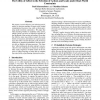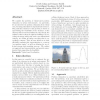135
click to vote
JMLR
2010
14 years 9 months ago
2010
Structured prediction tasks pose a fundamental trade-off between the need for model complexity to increase predictive power and the limited computational resources for inference i...
116
click to vote
ICAI
2009
14 years 12 months ago
2009
We present a novel affective goal selection mechanism for decision-making in agents with limited computational resources (e.g., such as robots operating under real-time constraint...
117
click to vote
UAI
1997
15 years 3 months ago
1997
We describe work to control graphics rendering under limited computational resources by taking a decision-theoretic perspective on perceptual costs and computational savings of ap...
113
click to vote
CRV
2006
IEEE
15 years 8 months ago
2006
IEEE
We consider the problem of vision-based position estimation in urban environments. In particular, we are interested in position estimation from visual cues, but using only limited...
119
click to vote
SOFSEM
2009
Springer
15 years 11 months ago
2009
Springer
Abstract. Computational mechanism design (CMD) seeks to understand how to design game forms that induce desirable outcomes in multiagent systems despite private information, self-i...
117
click to vote
STOC
2005
ACM
16 years 2 months ago
2005
ACM
A celebrated 1976 theorem of Aumann asserts that honest, rational Bayesian agents with common priors will never "agree to disagree": if their opinions about any topic ar...


